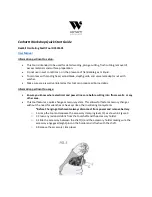
NOTE: Some accessories, such as scrapers and blades, can be mounted at an angle if required as shown
in Figure 5.
Information pertinent to Safety: (PPE (Personal Protective Equipment) (Personal Protective Equip),
workspace, etc.)
Familiarize yourself with the tool.
o
Make sure you are using the right tool for the job.
o
Get to know its safety features, moving parts, and hazards before beginning work.
o
Inspect tool for damage.
o
Never modify, tamper with, or attempt to change or repair tools and parts on your own.
o
If you suspect that a tool may be damaged, malfunctioning or in need of repair, stop
usage immediately, disconnect from power source, and contact the Carhartt Workshop.
Secure a safe workspace.
o
Make sure you are working on a clean, dry, level surface.
o
Clear any debris, trip, slip, fall hazards.
o
Make sure your workspace is properly lit.
o
Check that your workspace has proper clearance and is free of obstructions. Including
overhead obstructions such as power lines.
Wear proper PPE
o
Do your research and use the proper PPE with the correct safety ratings for the work
you are performing.
o
This includes but is not limited to safety glasses, face shields, earplugs, dust masks,
clothes toed shoes, and proper clothing and footwear.
o
Never wear baggy clothes, jewelry, or have longhair down and unsecured.
Handle Tools with care
o
Never carry power tools by their cords
o
Never leave tools unattended.
o
Disconnect from power and secure tools when they are not in use.
o
Do not carry sharp or pointed tools in your pockets.
Take your time
o
Do not rush or force materials through tools.
o
Pay attention to your work and surroundings.




















